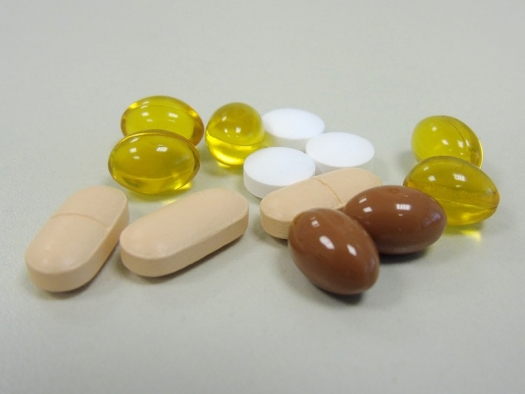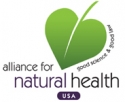VitaminPills4Kinds.jpg

Photo by Garak01 / Pixabay.com
The COVID-19 pandemic has exposed the many cracks in our crony medical system. As this crisis has unfolded, the health system has focused on finding a pharmaceutical drug, or a vaccine, that can treat the COVID-19 virus. Once found, this treatment will likely be expensive and carry dangerous side effects, as many drugs do.
Meanwhile, we’re told there’s little else we can do other than stand home and wash our hands. This is not bad advice, but of course it ignores the role of cheap, safe, and effective natural medicines that can be used to great effect. The FDA and the medical establishment willfully ignore the benefits of these natural products because they cannot make billions for the drug industry, on whose funding the FDA relies. Not only that, but natural products compete with drugs, so FDA rules prevent Americans from learning about the many health benefits of supplements.
We’ve seen federal agencies like the FDA and the CDC stand in the way of widespread testing for COVID-19 out of a dogged commitment to bureaucracy over public health.
We’re also learning that the rate of chronic illness in the US is putting us more at risk, not to mention all of the nutrient-depleting prescription drugs we are taking for those chronic illnesses.
Preventative protocols
Here are some of the highlights taken regarding pre-illness enhancement of immunity:
- Vitamin D can aid in respiratory health. It also has anti-inflammatory properties. Experts recommend maintaining blood levels of 25-hydroxyvitamin D over 50 ng/mL, with some recommending a level as high as 70 ng/mL. A physician knowledgeable in natural medicine should be consulted to determine the right level for you.
- Selenium deficiency predisposes to viral susceptibility; it also has antioxidant and anti-inflammatory properties. If you don’t have or can’t access selenium supplements, a few Brazil nuts per day (delivering 68-91 mcg selenium per nut) should suffice.
- Melatonin has been found to inhibit the action of an inflammasome that is known to be involved in the exaggerated immune responses in the most critical coronavirus cases, NLRP3. Age-related decline in melatonin production has been proposed as one of the reasons the elderly seem to be affected more by COVID-19 than the young. Dosing recommendations vary; some say 3-50 mg, others say 0.3 to 20 mg.
- NAC (N-acetyl cysteine) is a building block for glutathione, an essential compound for the body’s defense. It has a demonstrated impact on influenza. A 2017 meta-analysis found that treatment with NAC led to shorter stays in intensive care units in patients with respiratory distress syndrome. NAC has also been shown to reduce acute respiratory distress syndrome (ARDS). NAC is being used as part of standard management of patients in hospital settings.
- Beta glucans are naturally-occurring polysaccharides found in the walls of yeast, mushrooms, and other foods with powerful immune-enhancing properties against respiratory viruses. These are best taken on an empty stomach in the morning, with typical doses between 700 and 1500 mg.
- Zinc is essential for immunity. It is a potent antioxidant, supporting natural killer cell function. Crucially, many Americans have sub-optimal zinc levels, particularly the elderly, which compromises the immune system. Zinc may improve the chance of avoiding respiratory tract infections in the elderly and those who are zinc deficient. Importantly, zinc may prevent coronavirus entry into cells and appears to reduce coronavirus virulence. Increasing intracellular zinc concentrations has been shown to inhibit viral replication. Doses range from 25-80 mg per day as a liquid or a lozenge between meals.
- Garlic, especially aged garlic extract, enhances killer cell activity and T-cell function.
- Vitamin A supports the health of mucosal tissue; as COVID-19 affects mucosal tissue throughout the body, vitamin A could provide important protection and support. Generally, research demonstrates that vitamin A has an important role in proper immune function in response to viral infections. Vitamin A seems to work synergistically with zinc to influence immune function. Some recommend avoiding mega-doses of this vitamin, as there is potential that it can upregulate ACE2 receptors, which is the entry receptor for the COVID-19 virus. Due to the prevalence of vitamin A deficiency in the US (about 50% of the population) others point out the importance of maintaining appropriate levels, perhaps doubling the normal 800 to 1,500 mcg of retinol supplements per day for two to three days. Note that vitamin A should always be taken at a different time than vitamin D as they can be functionally antagonistic.
- Antiviral herbs like astragalus, green tea extract, monolaurin, and Andrographis all have immune-enhancing effects.
- Glutathione may help calm the immune system’s overreaction to the coronavirus known as a “cytokine storm,” which leads to respiratory distress. A recent case report found that two patients with COVID-19 and a history of Lyme disease (coinfection) treated with 2 grams of intravenous glutathione “improved their dyspnea [shortness of breath] within one hour of use.” A Russian paper argues that glutathione deficiency may be “the most likely cause of serious manifestation and death” in COVID-19 patients.
- MATH+ Hospital Treatment Protocol for COVID-19 was developed by a group of leading critical care specialists and is a highly effective combination therapy in controlling the extreme inflammatory response COVID causes.
Possible treatment options
There are key differences in approaches to treatment as opposed to prevention. The severe respiratory damage of advanced coronavirus cases is due to an overactive immune system that produces a “cytokine storm.” Some suggest immune-boosting strategies should therefore be used only for prevention, not treatment – you don’t want to stimulate an already overactive immune system at more advanced stages of infection. For treatment, the goal is to reduce inflammation and to down-regulate the NLRP3 inflammasome. Some nutrients that can be helpful may include resveratrol, curcumin, melatonin, andrographolides, luteolin, and thymoquinone (from black cumin seed). Silver also has its proponents as an anti-viral or to prevent follow up bacterial infections. Crucially, evidence has shown that silver hydrosol may be effective against certain strains of coronavirus like SARS.
- There is promising initial data regarding zinc, quercetin, and epigallocatechin-gallate (EGCG). High concentrations of zinc inside cells inhibit the replication of RNA viruses such as COVID-19, but due to zinc’s other characteristics, cells do not typically tolerate high levels of this mineral. Quercetin and EGCG enhance the entry of zinc into cells, much like the drug chloroquine. Note too that quercetin itself has anti-viral properties. There have already been animal trials on the zinc/quercetin combination for use against Ebola and SARS-CoV1, and human clinical trials have been approved by the FDA.
- Intravenous vitamin C (IVC) has been used to great effect in some New York hospitals. There are currently clinical trials underway in China assessing IVC’s ability to treat COVID-19, although we’re told that the dose being used is far too low to have a great effect, which is a shame since a negative result in the trial will give ammunition to skeptics. Clinicaltrials.gov lists a total of ten clinical trials underway around the world looking at vitamin C, often in combination with other supplements, and COVID-19.
- Potassium appears to be another key nutrient implicated in COVID-19 cases. Preliminary data show that COVID-19 patients exhibit hypokalemia (low potassium in the blood) and that potassium supplementation assisted recovery. Note that a national survey of 16,444 Americans found that 100% were not getting the estimated average requirement (EAR) of potassium (EAR is the intake level for a nutrient at which the needs of 50 percent of the population will be met). This critical nutrient could be saving lives, but the government is too busy searching for pharmaceutical interventions that can make drug companies rich.
- Viruses cloak themselves from the immune system using a substance called Nagalase. Some supplements, especially probiotics, are candidates to help control Nagalase.
- Oregano and monolaurin are candidates to attack the viral capsule.
- There is some difference of opinion surrounding several recommendations, such as elderberry, echinacea, and even vitamin D. There is a school of thought that, while these supplements support general immunity, when there is an infection they should be temporarily discontinued. Proponents of this view argue that, when the body is experiencing significant inflammation, vitamin D, for example, can activate the specific inflammatory molecule (IL-1B) which characterizes symptomatic COVID-19 infection. Similarly, elderberry extract and echinacea may help prevent the early stage of coronavirus infection, but some suggest they may also increase cytokine production, including IL-1B – meaning these herbs could potentially aggravate the inflammatory cytokine storm associated with severe COVID-19 cases. Other experts in the natural medicine community believe the above-mentioned effects to be negligible and that these substances are safe to use under any circumstances. As always it is best to consult with a knowledgeable physician.
- Ketones have powerful antioxidant effects, and may help deal with the cytokine storm that characterizes severe COVID cases. Ketones upregulate NADPH, which can help compensate for the release of cytokines. Ketones can be obtained from ketone esters or naturally through a low carb, high fat, moderate protein diet.
- Astaxanthin, an antioxidant that is derived from microalgae, could also be helpful as an adjunct therapy to relieve the cytokine storm found in COVID-19 cases. Astaxanthin is a powerful antioxidant, immune booster, anti-inflammatory, neuroprotector and immunomodulatory with antibacterial and anti-apoptotic effects.
The combination had already made it through animal trials for use against Ebola and SARS-CoV1, and was approved by the FDA for human clinical trials.
Resources
In the absence of a pharmaceutical treatment for COVID-19, we are not defenseless. There are a host of natural medicines that can help fortify or rejuvenate our immune system. Here are some excellent resources on this topic, in no particular order:
- ANH-International
- The American Nutrition Association
- Mark Hyman, MD
- Leo Galland, MD
- Jeffrey Bland, PhD
For more information, visit the Alliance for Natural Health.


